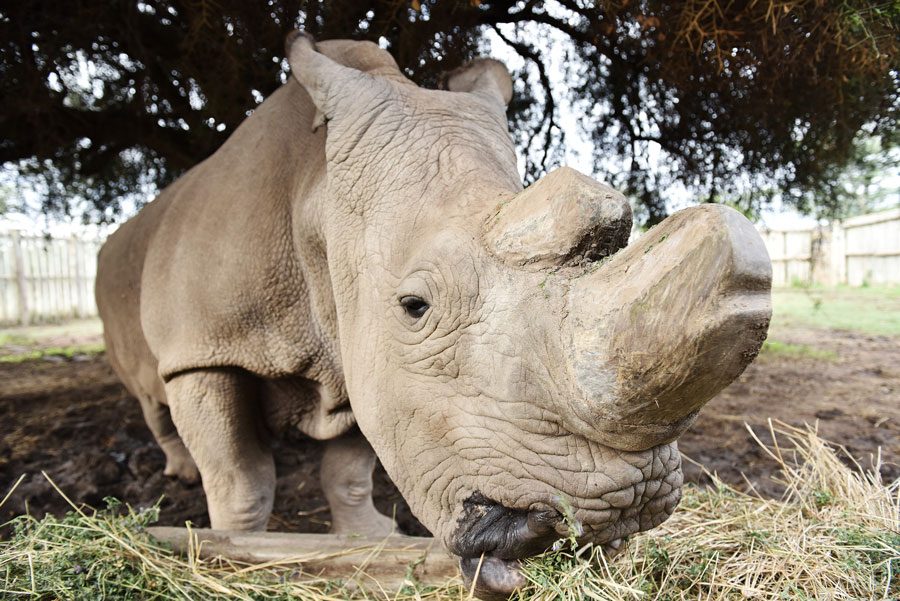Illinois activists, lawmakers react to Trump administration changes to Endangered Species Act
Sudan, the last male northern white rhino, feeds himself inside an enclosure at Ol Pejeta Conservancy in Nanyuki, Kenya, on April 18, 2015. Illinois joins multiple other states in filing a lawsuit against the Trump administration’s proposed changes to the Endangered Species Act.
October 28, 2019
In August, the Trump administration announced that it would make some of the largest changes to the Endangered Species Act in the law’s 46-year-history.
Originally, the law prioritized protected species over development, such as building dams or drilling for oil. Now, the administration aims to weigh in economic factors before granting species and lands protected status.
In response to the announced revisions, 17 states including Illinois filed a lawsuit to prevent the changes from going into effect.
In a news release, Illinois Attorney General Kwame Raoul argued that the “rollbacks” make the law void by stripping it of its most essential provisions.
“With these new rules, the federal government is once again turning its back on science and putting these species and the environment at risk,” Raoul said.
Evanston legislators also supported the lawsuit and the current version of the Endangered Species Act.
State Rep. and Chair of the Illinois Legislative Green Caucus Robyn Gabel (D-Evanston) said the lawsuit presents an opportunity for Illinois to stand by the law and be a leader in environmental advocacy.
“The repeated attempts at rolling back important protections for endangered species in Illinois is an example of how special interest groups use state level policy to advance their agenda,” Gabel said in an email to The Daily. “With environmental protections under attack federally, Illinois can and will be an environmental leader at the state level.”
Prof. Keith Woodhouse, director of the Environmental Policy and Culture Program at Northwestern, said the law grants protection status for species based on scientific and environmental factors, setting aside economics. He said this made the legislation one of the most powerful reforms in the environmental movement.
“One of the reasons (the law is) so powerful is that economic issues were not supposed to be a factor,” Woodhouse said. “The federal government had to protect that species as best they could, regardless of the economic consequences.”
At the height of the environmental reform movement, President Richard Nixon signed the law in 1973 with a number of other bills meant to target environmental issues, including clean air and water regulations and the formation of the Environmental Protection Agency.
Today, while conservation groups wait on the court’s decision, they have focused on investing in on-the-ground efforts for protecting endangered species, said Erik Schneider, national policy director for the National Audubon Society.
“We need to be doing much more than we have been doing,” Schneider said. “We need more resources on the ground.”
The lawsuit also has political strategies, too, Woodhouse said. With the 2020 election a little more than a year away, there is hope that it will stall the proposed changes until the general election, Woodhouse said. And because the changes are “administrative,” the process to reinstate the original law would be much simpler, Woodhouse said.
But in the event of a Trump victory next year, Woodhouse expects the legal battle to rage on.
“If Trump is elected again, it will go all the way to the Supreme Court,” Woodhouse said.
Email: [email protected]
Twitter: @zamoneperez


